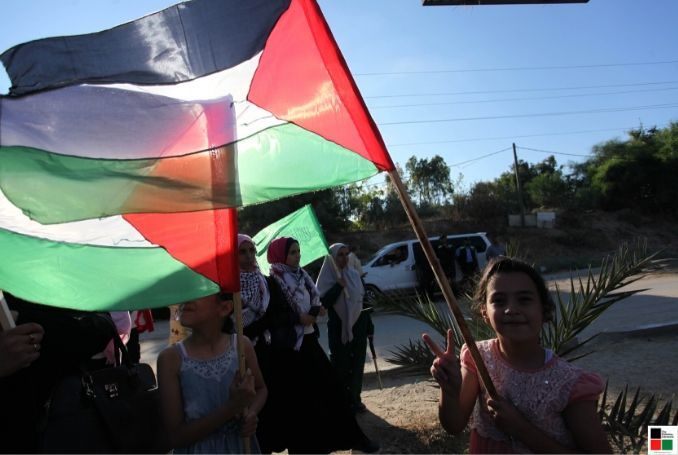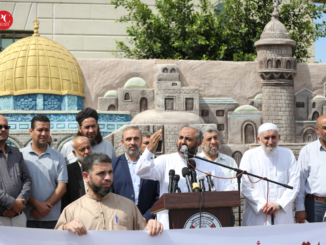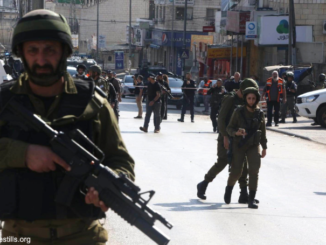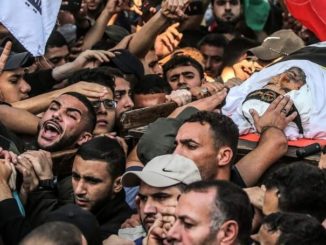
By Benay Blend
Like for Palestinians, existence is resistance. Narratives change, and our understanding of the truth changes over time.
Since October 7, the news from Palestine has been bleak.
Bombing and raiding of hospitals, displaced people and demolished homes, lack of electricity, clean water, and food—the Zionists’ goal of ethnic cleansing has escalated over the past few weeks.
Writing for We Are Not Numbers, Dana Besaiso asks: “What would happen if the Palestinian narrative lacked misery? Would we still be creative?”
For as long as she could remember, Dana’s story has been one of “sorrowful events,” so much so that she must remind herself that this is not a normal way to live.
Would she be able to write cheerful stories if the misery went away?
Dana’s question is complicated by the fact of generational trauma, mental issues that are passed down from parent to child long after the initial event is over.
In the case of Palestinians, the Nakba of ’48 never ended, but instead continues in the form of daily catastrophes that sometimes escalate as is the situation now.
For Indigenous people in Canada and the United States, there is a similar condition caused also by colonization of their land.
Two recent novels tackle this problem, Etaf Rum’s Evil Eye (2023) and Alicia Elliott’s And Then She Fell (2023).
Although written about different groups of people, both bear witness to settler colonialism, especially as it plays out in Israel’s current genocidal war.
Rum’s book tells the story of Yara, Brooklyn-born daughter of Palestinian immigrants who left to give their daughter what they hoped would be a better life.
Like the late Palestinian artist Heba Zagout, who was recently murdered, along with two of her children, by an Israeli airstrike on her home in Gaza, Yara’s art draws from the tragedy of Palestine’s past but also the beauty that she witnessed during summers with her grandmother in Palestine.
“Drawing helped soothe the twisted feeling inside her,” Yara claims, “the dark pit of fear in the center of her chest,” (p. 13) the result of generational trauma.
Like many others, she felt that she had lived her life carrying this burden, “a weight that she could not put down” (p. 19).
On the other hand, her grandmother shared stories of Palestine with her: the olive trees that they had to leave behind, the beautiful dome of Al Aqsa Mosque, and other memories that countered the trauma of the Nakba.
Yara escapes her troubled home through marriage that turns out to be equally stifling of her wishes.
At this point, she appears to hold a Western stance on feminism, a position that focuses on individual achievement and desires. Eventually, she leaves her husband, shares custody of her children, and has time to decide to focus on her future.
When Yara takes her children to visit an artist’s studio that provides evenings for others to express themselves through paint, she realizes that she wants to start a workshop of her own, a place for other artists of color to show their work but also a space for people to learn about art therapy.
She has moved from an individualist perspective to one that more closely aligns with the Palestinian notion of sumud (steadfastness), a resilience born not of individual heroism but collective overcoming of adversity.
Like Heba Zagout, who instilled in her students and audiences worldwide a narrative of endurance in the face of loss, perhaps Yara will break the cycle of trauma in her family by turning anger into collective action for her community.
“One day you’ll do things better than we did,” Yara’s mother tells her. “Inshallah you will” (p. 340).
As Yara learns to trust others, forming the kind of support group that her mother never had, it seems that perhaps she will.
Rum’s writing stems from a similar source, that of “want[ing] to create a space for Palestinians on the literary bookshelf and to share stories that might otherwise remain untold or ignored.”
Nevertheless, she has found that, during the “ongoing genocide in Gaza” that has lasted for over a month, empathy has become a “performative gesture, confined to the realm of fiction and failing to take root in the real world.”
Indeed, during the past few weeks she has been asked to renounce her support for Palestine, even to the point of some labeling her a terrorist when she refuses.
Her novels, she explains, address the “enduring trauma inflicted upon the Palestinian people by the Israeli occupation, a trauma that persists through generations and causes suffering to those living under occupation and in exile.”
While readers could empathize with characters on the page, they apparently could not transpose that compassion to real life.
“Awareness alone is not enough,” Rum warns. “If you can recognize our humanity in the pages of fiction, do not leave your empathy between the covers.”
Similarly, Alicia Elliott’s And Then She Fell focuses on three generations of Mohawk women who pass the trauma of colonized life down through their mothers.
The novel opens with Alice leaving her people to marry a white academic, hoping, like Yara, that leaving home will bring her a measure of independence.
But coping with motherhood in an urban setting with no familial support leaves Alice facing a breakdown.
“Folks off the rez introduced themselves by explaining how they made money,” she explains, “as if that said anything substantial about who they were or what they offered their communities or the world” (p. 59).
She missed her old familiar setting where “each person [was] a walking history book, a branch waiting to find more family trees to graft onto” (p. 59).
What is real, what is imagined, either from drugs and/or mental illness, remains unclear, because in the end it doesn’t matter. The imagery is clear.
At a dinner party surrounded by her husband’s faculty friends, Alice believes that each diner morphs into a Flying Head ready to cannibalize her knowledge to bolster their own professions.
Like Alice, Elliott’s mother underwent bouts of mental illness, then as an adult Elliott herself had a mental breakdown.
Thus she understands her fictional character well.
In an interview, she relates that “stories reflect the world,” but what happens when the stories are told by a person who is suffering from delusions?
Whether Alice’s experience was “real” or not, Elliott explains, “it still held meaning for her, helping to metaphorically illuminate the things her conscious, ‘sane’ self, did not or would not face.”
The author hopes that her stories will “plant seeds [for] change,” much like the seeds that Palestinians plant literally and metaphorically in hope of a better future.
Realizing that her worth depends on her Indigeneity that her husband hopes will benefit his career, Alice leaves with her daughter Dawn.
Back at home, she continues to write down the Creation stories that her father had hoped to turn into a book. Like Yara, she copes with mental illness stemming from her tribe’s long history of colonization.
Indeed, Elliott’s condition, possibly inherited from her mother, adds another layer onto her life under colonialism, that which she calls “saneism,” a lens through which she is seen as an “unreliable narrator” of her story.
Like Palestinians, who are told that, in fact, they have no story, Elliott had to find a way to communicate this reality to the world.
Because the power of fiction, she believes, is its “unreality,” Elliott found the narrative form a perfect medium for her writing.
Her novel ends with her granddaughter Edie in a prison cell contemplating her life.
Eventually, she concludes that it was community that enabled her to survive. Like Yara, she learns that practicing sumud is a collective act based on mutuality and cultural survival.
In a recent post on Instagram, Elliott links her struggle with that of the Palestinians.
“None of us are free until all of us are free,” she declares, as she connects native voices with “protestors across Canada who are decrying the unfolding genocide across Palestine and Gaza.”
From her mother, she concludes that she has learned to “cling to hope, as unlikely as it seems,” much like people are coping at this moment in Gaza.
Returning to Elliott’s novel, Edie’s grandmother closes with wise words of advice. “When this country wants us dead,” she claims, “every breath we take is a tiny revolution. You don’t need to do nothing fancy. Just continuing to breathe is enough” (p. 328).
Like for Palestinians, existence is resistance.
Narratives change, and our understanding of the truth changes over time.
What history will be written of the current genocide of Palestine in twenty years?
Hopefully, it will come closer to the Palestinian version of events rather than the story that the media and Western governments are generating at this time.

– Benay Blend earned her doctorate in American Studies from the University of New Mexico. Her scholarly works include Douglas Vakoch and Sam Mickey, Eds. (2017), “’Neither Homeland Nor Exile are Words’: ‘Situated Knowledge’ in the Works of Palestinian and Native American Writers”. She contributed this article to The Palestine Chronicle.








I’m what people call a “Third Culture Kid” – born to New Zealand parents in Papua New guinea and raised up to my ninth year there, I always felt a misfit in New Zealand and Australia, where I spent the rest of my growing up. Following a Traumatic Grain Injury during my first year at Uni, I went to a Marae and felt at home for the first time in New Zealand – because I recognized similar things to my childhood experience in Papua New Guinea. I spent the rest of my rehab years at my parents’ home, carrying out a fierce letter-writing campaign to get New Zealand to acknowledge the harm colonization had done to the Maori. I think I may have helped.